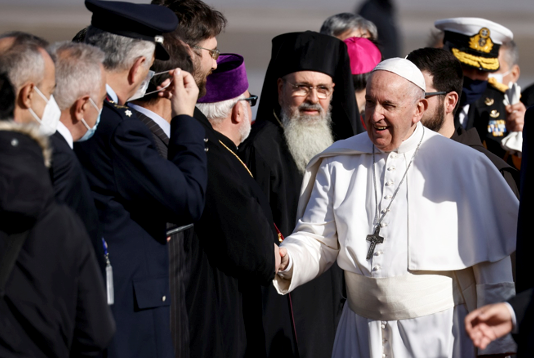WelCom February 2022

On his December visit to Greece, the birthplace of democracy, Pope Francis sounded the alarm that democracy is under threat across the globe, as authoritarian leaders fuelled by populist and nationalistic interests are on the rise.
‘Today, and not only in Europe, we are witnessing a retreat from democracy,’ the Pope said, warning that the common bonds of society are being severed by an increasing scepticism of institutions, hyper-individualism and partisanship – all heightened by social media that deepens divisions.
Addressing Greece’s political leaders, just over a mile from Athens’ iconic Parthenon, Pope Francis called Europe to return to its democratic roots.
‘Democracy requires participation and involvement on the part of all. Consequently, it demands hard work and patience,’ he said. ‘It is complex, whereas authoritarianism is peremptory and populism’s easy answers appear attractive.’
Over the last decade, Greece has suffered a severe financial crisis that plunged the country into political chaos, giving rise to both right-wing and left-wing populist movements that destabilised the country’s economy and nearly decimated its social programmes.
In a spirited address peppered with references to Greek philosophy and literature, the Pope lamented how far the Western world has drifted from its heritage of a politics built around the common good.
‘The European community, prey to forms of nationalistic self-interest, rather than being an engine of solidarity,’ he said, ‘appears at times blocked and uncoordinated.’
The Western world, Francis continued, is ‘trapped’ in a ‘frenzy of a thousand earthly concerns and the insatiable greed of a depersonalising consumerism.’
As he recalled the country’s political heritage, the Pope said it was in Greece that people began ‘to see others not as subjects but as fellow citizens’ and as participatory members of a community.
He pleaded for a return to those foundational principles, urging a recovery of ‘the art of the common good’ and a move from ‘partisanship to participation,’ one that he said should prioritise ‘the weaker strata of society.’
Francis went on to rebuke world leaders engaged ‘in an obsessive quest for popularity’ and ‘a thirst for visibility.’
Concretely, the Pope urged solidarity in the fight against climate change – ‘lest children once more have to pay for the hypocrisy of their fathers’ – and a greater welcome of migrants and refugees, which, in a nod to the classical Greek poet Homer, he described as ‘protagonists of a horrendous modern Odyssey’.
Sources: National Catholic Reporter, Vatican News
Pope Francis’ address is on the Vatican website: tinyurl.com/Pope-democracy-address or www.vatican.va/content/francesco/en/speeches/2021/december/documents/20211204-grecia-autorita.html